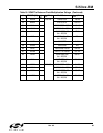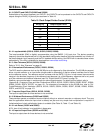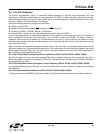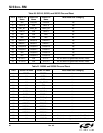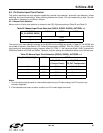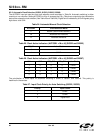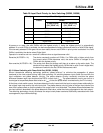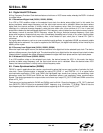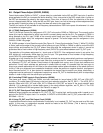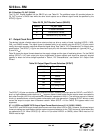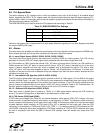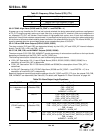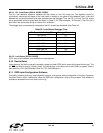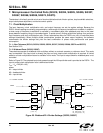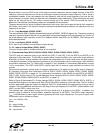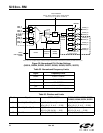
Si53xx-RM
Rev. 0.5 71
6.6. Output Phase Adjust (Si5323, Si5366)
Overall device skew (CKINn to CKOUT_n phase delay) is controllable via the INC and DEC input pins. A positive
pulse applied at the INC pin increases the device skew by 1/f
OSC
, one period of the DCO output clock. A pulse on
the DEC pin decreases the skew by the same amount. Since f
OSC
is close to 5 GHz, the resolution of the skew
control is approximately 200 ps. Using the INC and DEC pins, there is no limit to the range of skew adjustment that
can be made. Following a power-up or reset, the skew will revert to the reset value.
The INC pin function is not available for all frequency table selections. DSPLLsim reports this whenever it is used
to implement a frequency plan.
6.6.1. FSYNC Realignment (Si5366)
The FS_ALIGN pin controls the realignment of FS_OUT to the active CKIN3 or CKIN4 input. The currently active
frame sync input is determined by which input clock is currently being used by the PLL. For example, if CKIN1 is
being selected as the PLL input, CKIN3 is the currently-active frame sync input. If neither CKIN3 or CKIN4 are
currently active (digital hold), the realignment request is ignored. The active edge used for realignment is the
CKIN3 or CKIN4 rising edge.
FS_ALIGN operates in Level Sensitive mode (See Figure 19, “Frame Synchronization Timing.”). While FS_ALIGN
is active, each active edge of the currently-active frame sync input (CKIN3 or CKIN4) is used to control the NC5
output divider and therefore the FS_OUT phase. Note that while the realignment control is active, it cannot be
guaranteed that a fixed number of high-frequency clock (CKOUT2) cycles exists between each FS_OUT cycle.
The resolution of the phase realignment is 1 clock cycle of CKOUT2. If the realignment control is not active, the
NC5 divider will continuously divide down its f
CKOUT2
input. This guarantees a fixed number of high-frequency
clock (CKOUT2) cycles between each FS_OUT cycle.
At power-up or any time after the PLL has lost lock and relocked, the device automatically performs a realignment
of FS_OUT using the currently active sync input. After this, as long as the PLL remains in lock and a realignment is
not requested, FS_OUT will include a fixed number of high-speed clock cycles, even if input clock switches are
performed. If many clock switches are performed in phase build-out mode, it is possible that the input sync to
output sync phase relationship will shift due to the accumulated residual phase transients of the phase build-out
circuitry. If the sync alignment error exceeds the threshold in either the positive or negative direction, an alignment
alarm becomes active. If it is then desired to reestablish the desired input-to-output sync phase relationship, a
realignment can be performed. A realignment request may cause FS_OUT to instantaneously shift its output edge
location in order to align with the active input sync phase.
6.6.2. Including FSYNC Inputs in Clock Selection (Si5366)
The frame sync inputs, CKIN3 and CKIN4, are both monitored for loss-of-signal (LOS3_INT and LOS4_INT)
conditions. To include these LOS alarms in the input clock selection algorithm, set FS_SW = 1. The LOS3_INT is
logically ORed with LOS1_INT and LOS4_INT is ORed with LOS2_INT as inputs to the clock selection state
machine. If it is desired not to include these alarms in the clock selection algorithm, set FS_SW = 0. The FOS
alarms for CKIN3 and CKIN4 are ignored. See Table 33 on page 74.
6.6.3. FS_OUT Polarity and Pulse Width Control (Si5366)
Additional output controls are available for FS_OUT. FS_OUT is active high, and the pulse width is equal to one
period of the CKOUT2 output clock. For example, if CKOUT2 is 622.08 MHz, the FS_OUT pulse width will be 1/
622.08e6 = 1.61 ns.
6.6.4. Using FS_OUT as a Fifth Output Clock (Si5366)
In applications where the frame synchronization functionality is not needed, FS_OUT can be used as a fifth clock
output. In this case, no realignment requests should be made to the NC5 divider. (This is done by holding
FS_ALIGN to 0 and CK_CONF = 0).



